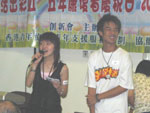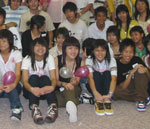|
Cyber
world more accessible to youth
With
a significant contribution of US$2million for software,
cash and training packages, technology giant Microsoft
Hong Kong Limited is partnering the Federation
over the next few years in the setting up 18 Cyber S.P.O.Ts.
The Cyber S.P.O.Ts - known by Microsoft as Community Technology
Learning Centres (CTLCs) -are to be located in Youth
S.P.O.Ts where technology and training will be available
to underprivileged members. Participants in the training
scheme will also be able to borrow a notebook computer
free of charge and surf the Internet on broadband. Hosted
by the Federation, a ceremony marking the signing of the
memorandum of understanding between representatives of
Microsoft and the Federation was held on 10 August and
the official launching of the programme took place on 30
November.
|
 |
|

Job Expo
balm to youth unemployment
Looking
after youth employment needs, the Federation and the Home
Affairs Bureau of the HKSAR Government with the support
of our media partner JobMarket, organized the Youth Job
Expo with 43 business corporations in Olympian City 2 on
19 November. 2,000 job vacancies were advertised at the
Expo and we would like to express our gratitude to the
supporting organizations that contributed to the success
of the event. Moreover, we were very pleased that Mr. Stephen
Ip, Secretary for Economics Development and Labour of the
HKSAR Government, could join us as officiating guest of
honour and Mr. Yip Kim Po, Chairman of Ocean Grand Holdings
Limited could also be with us to speak of his experience
in the corporate world. On-site interviews and talks on
job interview skills also took place on the day. The Job
Expo succeeded in helping 156 youngsters find jobs. Click
to read the press release:
http://u21.org.hk/press/
|
 |
|
Attachment Programmes for Youth Workers
In
November and December, 5 social workers from Singapore
and 4 youth workers from Shanghai will undergo
attachment to nine of our Federation's service units.
The Federation has been organizing these reciprocal Attachment
Programmes for Youth Workers in collaboration with National
Youth Council of Singapore and Shanghai
Youth Federation for several
years now. Every year, a 2-3 week attachment in our own
service units is arranged for groups of youth
workers from Singapore and Shanghai and subsequently, two
pairs of Federation staff undergo a 2-week attachment to
youth work social service units in Singapore and Shanghai
respectively. Valuable exposure
to different approaches in rendering youth services is achieved
through attending workshops and site visits while an exchange
of views is beneficial to all concerned.
|
|
|
 |

Making children
safe online
For today's
youth the Internet offers opportunities beyond any of our expectations.
In a decade, it has revolutionised the classroom and is a major
interface between children and technology. But with it have come
challenges, risks and dangers. They include pornography, harassment
and the online soliciting of children. This is a very serious
concern, especially when the majority of our secondary students
have received obscene material online.
|
|
Risk
management techniques at home, at school, via the media, government
and the law have to tackle the problem. With parents' and children's
awareness raised, projects such as the Federation's forthcoming
exchange camp and international conference on the subject can
be effective. With Hong Kong's Internet service providers regulating
website content and being backed up by law enforcement, the healthy
cyber world of the future can become a reality. Any child going
online should be able to do so safely. That is our goal and we
can reach it through a concerned, concerted effort.

|

From night
drifter to volunteer student
Since 2002 the number
of youngsters who regularly spend the night out on Hong Kong's streets
has stayed over 10,000 despite work
by members of outreach groups. Night drifters hang out in parks,
cafes and playgrounds, sometimes going to community hostels. Use
of the hostels has doubled since 2001 but the draw of night-time
entertainment keeps number rising slowly. What are the other factors?
One is unemployment. Another is peer pressure. A third is disharmony
at home – and this is where the problem almost always starts.
Fion used to
be a night drifter but she got on top of her problems and is
now doing an
associate degree. On the way she had a lot
of help from Joey, a professional social worker who is with the
Federation's Youth Support Scheme (YSS). Joey persuaded her to
help out in various volunteer projects and now she is passionately
interested in helping others. But she started getting into trouble
at the tender age of 12.
"...all I
wanted to do was play around…there was nothing
for me at school and not much at home either…" Fion
All manner of bad influences came Fion's way. In those
days she was very impressionable and with her best friend Christy joined in several
nefarious activities,
never expecting to be caught. When the police did pick them up they handed the
F2 students over to us for counselling. Joey gradually won Fion & Christy's
trust and it turned into a very positive relationship. Meantime there was break-up
between Fion's parents who were already on the way to divorce. Joey helped Fion
to cope with that too.
I watched while
Fion's attitude to her family changed,
she saw her parents in trouble and realized her role in holding
things together. Joey
Throughout
their teens Fion and Christy were involved in Federation programmes,
not only volunteering, but doing fitness training and a course
on beauty and makeup. But Fion kept going back to VNET (the Youth
Volunteer Network), helping with the Odyssey of the Mind Programme,
working with elderly people and eventually visiting breast cancer
patients during the Rainbow for Life project.
Naturally
all these experiences gave them a boost - not just in self
confidence but in their sense of self worth - a very important
change for youth at risk. Both say how meaningful they found helping
others, especially young people, and particularly when those youngsters
follow their example and become volunteers themselves. Even the
principal of their old school at Tsing Yi was convinced and community
work has become a recognized extra-curricular activity.
As time went by, Fion, once bottom of the class, started to take
school more seriously. She wanted to become a social worker by
now and realized that meant passing exams. Joey, her counsellor
and role model saw her potential and nominated her for an outstanding
volunteer VNET award when she was 16. In the same year she took
part in YSS-organized group sharing sessions at Tsuen Wan and Kwai
Tsing primary schools, describing to Primary 5 and 6 children what
it was like to have been a vulnerable young teen but to have triumphed
over her own shortcomings. This achievement earned her another
award.
" I have learned
how to care for others", says Fion. "Now it's time to share
that experience".
By Form 7 she
had gained enough points in the public examinations to be accepted
at the
City University of Hong Kong. Fion hopes
eventually to do a degree in social work. Meantime she keeps up
her volunteer work and will be standing by at the ceremony this
weekend, proudly watching while her old friend Christy - once her
partner in petty crime - follows in her own footsteps, climbing
up on stage for her own outstanding volunteer award.
|




|
 |
 |
|
Domestic
tragedy
In February
this year a jilted, emotionally disturbed Sham Shui Po woman
attempted to kill her two children and herself. Then came the
much-discussed triple murder-suicide in Tin Shui Wai. Three weeks
ago a divorced, unemployed man threw himself and his son off
the balcony. Is the problem of family violence worse in Hong
Kong than elsewhere? No, but it is increasing (see table) and
our crowded city amplifies the situation. Zero tolerance to domestic
violence is the official policy and guidelines to help social
workers evaluate the risks in family disputes have either been
recently revised or are currently under review. Meanwhile the
police are setting up a central database of family violence cases
and parent mentors have also been proposed.
When young
people are involved we are always ready to step in. Federation
counsellors work with youth at risk and over-stressed, anxious
parents. Where there are shortcomings in existing social services
we always hope we might be able to fill the breach. But, as with
back-up to any official service, we need to offer both adequate
resources and careful cooperation.
Statistics
on family violence 2002-2004
Newly
reported cases
|
Jan-June
2004
|
Jan-Dec
2003
|
Jan-Dec
2002
|
Child
abuse
|
293
(half-year)
|
481
|
520
|
Battered
spouse
|
1706
(half-year)
|
2564
(Jan-Sept)
|
3034
|
|

|
 |
|
| Compulsive
gamblers get younger
Young people
are exposed to gambling advertisements from their formative years
so perhaps a gradual increase has been inevitable. Findings of
a Hong Kong Young Women's Christian Association telephone poll,
conducted between March and August this year among 4,110 interviewees
confirm this trend, showing a slight increase of 1.45% in the
number of problem gamblers compared to a similar survey done
in 2000. However, the more alarming finding was that 12% of youngsters
in the group, aged 12 to 18, met internationally recognised criteria
for pathological gamblers. This matches findings in the US where
10-17% of teenagers are considered problem gamblers and that
represents 2-3 times the adult rate. More counselling services
and educational programmes are needed for these young punters
since some of them go down the wrong track due to lack of proper
guidance. In the meantime, to prevent things going from bad to
worse, Doris Wu, a clinical psychologist with the Association,
suggested that parents and siblings should make a solid stand
against family members' demands for money to gamble with while
being aware of the compulsive nature of their habit.
|

|
 |
|
December
1st World AIDS Day
HIV/AIDS emerged 20 years ago. Now, 1 person in every 200 worldwide has the disease.
39.4 million people aged 15-49 suffer from it and 2.1m are under 15 years old.
More than 50% of all new infections are in the young (under 25) and 6000 more
youth become infected every day. In 2004 alone about 5 million will become infected,
25% of them Asian. New cases jumped by 50% in East Asia this year, most notably
in China.
AIDS in China has raised its ugly head very abruptly above the parapet. In January
1993, an estimated 17% of the population of China had never even heard of AIDS.
Now, UNAIDS estimate that by 2010 ten to twenty million people in China will
be HIV positive.
“China has everything to gain if it can stem the tide of
the AIDS epidemic, and everything to lose if it fails” - Kofi
Annan.
|  |
| |
|
|

